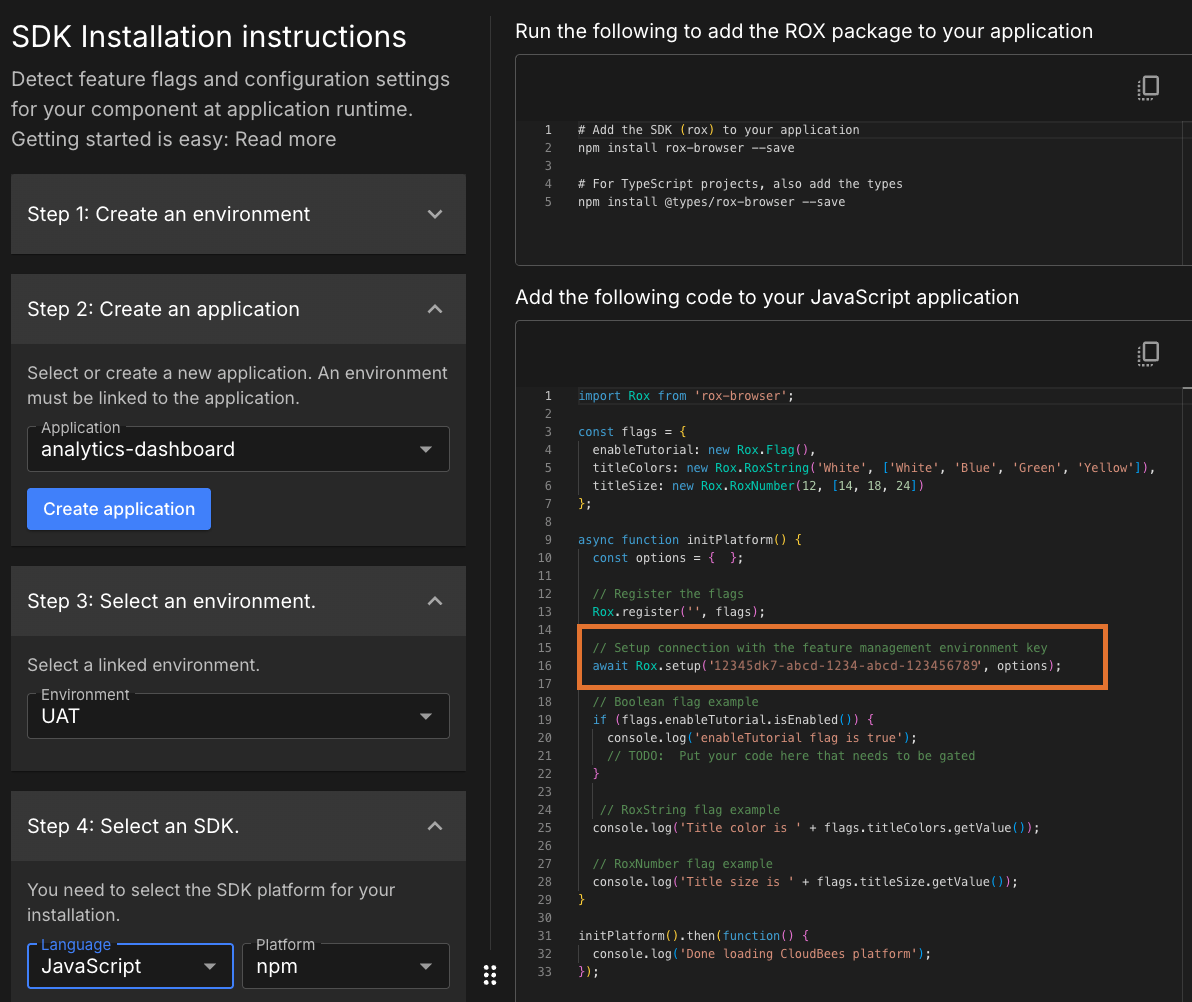| The CloudBees platform requires that your installed SDK version be at least 6.x. Please install the latest SDK by following the instructions in the platform UI or at the links in the table below. |
To use feature management in the platform, install a software development kit (SDK) in the code language of your application.
Client-side SDKs execute code on the client’s device, such as web, mobile, desktop, or over-the-top (OTT) applications. Server-side SDKs are sent to a central server to be processed and updated using a periodic refresh. Hundreds or more requests can be processed at once, but requests can take longer to process than client-side SDKs.
Because client-side and server-side SDKs work with flag configuration data in different ways, some capabilities and features are only available for a specific type of SDK.
SDK installation instructions and SDK key
Stepwise instructions for SDK installation are available in the platform UI.
To access the SDK installation instructions:
-
Navigate to .
-
Select
 to view the guided setup steps.
to view the guided setup steps. Figure 1. Access the installation instructions
Figure 1. Access the installation instructionsThe UI guides you through creating an environment, linking the environment to an application, installing the SDK, and getting started with feature flags.
 Figure 2. SDK installation instructions
Figure 2. SDK installation instructions -
Once the SDK is installed, you may view and make a copy of your SDK key. To locate your new SDK key:
-
Navigate to , and select the application where relevant flags are configured.
-
Select
 to copy the environment-specific SDK key for use in your application code.
to copy the environment-specific SDK key for use in your application code. Figure 3. Locate your SDK key
Figure 3. Locate your SDK key
-
Evaluate feature management
To evaluate feature management, set up an integration with one of the example applications for the code language of your choice. Observe how the example application updates in real time as you modify flag values within the platform.
For each code language, the following table lists links to more information.
| SDK installation instructions | Example application instructions | Example application source code | SDK reference |
|---|---|---|---|
SDK reference
The latest 6.x reference includes useful functions and code examples.
| Do not use any SDK version prior to 6.x in the CloudBees platform. |
Customer privacy is assured
The CloudBees platform architecture is built around privacy. The platform does not have access to and cannot save end-user data, such as personally identifiable information (PII).
Flag configurations that target specific customers occur on the client side (mobile app, web app, or a backend system) with locally available attributes and are never transmitted back to CloudBees.
| SOC 2® is a Service Organization Control (SOC) framework administered by the American Institute of CPAs (AICPA) that assesses an organization’s adherence to the five Trust Service Criteria (TSC). The CloudBees platform is SOC 2 type II compliant. |
Resiliency
The platform is protected from outages by using a stateless architecture by default. Each SDK pulls a static JSON file from cloud storage.
The stateless architecture has several key advantages:
-
Scale: It does not matter if you have hundreds of users or millions of users; the SDK fetches a static file.
-
Speed: No computation is done on the CloudBees servers. All flag computation is done in memory on the target platform.
-
Resiliency: CloudBees servers are NOT in the critical path of your software. If the platform is compromised, flags cannot be updated in the UI, but your application is not affected. The SDKs have a caching mechanism. In the case of a network issue, the effects are minimal.
-
Privacy: CloudBees has no access to user private data, which is only stored on the target application.
-
Global usage: CloudBees leverages the power of Amazon CloudFront for its content delivery network (CDN), which provides a unique advantage over competitor products that report outages in certain geographic areas. Developers need not create proxies or bootstraps that would otherwise be necessary to maintain a connection in problematic regions.
| The platform uses Server-Sent Events (SSE) to push a message to the SDKs to download a new JSON config file in response to any changes in configuration, so changes are propagated to the clients instantly. |